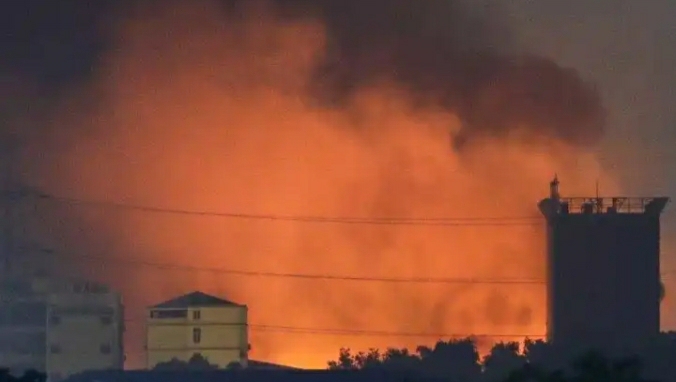by Subir Bhaumik (Writer & Columnist, Former BBC Correspondent)

President Xi Jinping’s Belt and Road Initiative (BRI) is up against a huge challenge in what Beijing had started considering as its backyard.
Pro-democracy protestors, who see China as the main backer of the military junta that seized power on Feb 1, have started attacking Chinese business interests as never before.
The anti-Chinese violence is reminiscent of the one that swept across Myanmar in 1967-68 when the Ne Win led military regime, resenting Chinese backing for a Communist insurrection, provoked public anger against Chinese business interests. Twenty years later, China regained trust of the Burmese military Tatmadaw by backing its ruthless suppression of the 1988 uprising and ended up turning Myanmar into a satellite. Or so it would have thought.
The first jolt to its ambitions came into 2008-09 when Kachin tribesmen successfully opposed the $6 bn Myitsone hydel project, triggering a furious reaction by Burmese civil society and democratic parties. Aided by the global human rights and anti-big dam environmentalist groups, the Burmese people finally forced the quasi-military regime of General Thein Sein to stop the China-funded project. A decade later, despite intense lobbying, Beijing is not anywhere near resumption of the mega project.
But now Beijing, seen as the main backer of the military junta, is having to bargain for something much worse.
Pro-democracy protestors, mowed down by military gunfire on the streets of Myanmar’s towns, are turning to Chinese-financed factories and businesses, setting them on fire and even attacking managers and workers.
The protestors who want the restoration of parliamentary democracy in the country and a scaling down of the military’s influence, feel attacking Chinese business interests will force Beijing to pressurize the Burmese military to back down, hand back power to the elected lawmakers and allow Nobel laureate Aung Saan Suu Kyi to form government a second time.
The Chinese were upset with the Suu Kyi government because it not only refused to resume the Myitsone Dam project but also cut down the investment size of the Kyaukphyu deep sea port project and drafted in other foreign partners for the Yangon City Mega project in July last year, refusing to hand over monopoly of executing the project to the China Communication and Construction Company.
This Chinese firm was accused of corruption in as many as 10 Asian and African countries where it is undertaking infrastructure development projects.
Thirty-seven (37) China-funded factories have been burnt down so far with protestors risking their lives against Burmese military action to set fire to these factories. Chinese businessmen are complaining of huge difficulties in doing business from sourcing jade in the Mandalay wholesale market to running the Lepetdaung copper project. Interestingly the Chinese joint ventures are mostly with Burmese military backed companies – so hitting one impacts the other. Protestors are also threatening to blow up the Kyaukphyu-Yunnan oil-gas pipeline linking a China-financed deep-sea port on Myanmar’s Rakhine coast to its Yunnan province.
If the military repression does not stop and the peaceful protestors turn violent leading to the emergence of armed urban insurgency in the Burmese heartland, terror attacks on key China-funded infrastructure is a distinct possibility. That would seriously threaten the China-Myanmar Economic Corridor, one of the two key BRI growth corridors along with the China-Pakistan Economic Corridor (CPEC).
The CPEC is also under attack with a surge of deadly attacks by Baloch separatists who resent the exploitation of their mineral and hydrocarbon resources by Chinese companies who arms twist the Imran Khan government into granting huge concessions. Security risks and costs of the USD 60 billion CPEC are rising amid a resurgence of the deadly attacks by separatists in the troubled Balochistan province but the CPEC projects are also upsetting the Shias of Gilgit and Baltistan where the CPEC starts.
Scores of China-funded huge infrastructure projects have been cancelled or are on hold in Indonesia, Malaysia, Philippines. Bangladesh torpedoed the Chinese deep-sea port project at Sonadia and handed over a similar project to Japan on its southern coast. In Sri Lanka, the long leasing of the Hambantota port to China after the government realized its inability to service the unsustainable debt, has created not only much angst against Beijing and its friends in the island nation but send out a global alarm on Chinese-funded project, raising serious doubts about Beijing’s motives in driving up the project scale and then bargaining for outright long-term control over national assets – the ‘debt burden strategy for economic and political control’, as some Western geo-strategists have described it.
But in keeping with the Newton’s law of every action generating equal and opposite reaction, China, seen as the global tormentor for its handling of the Covid pandemic, is seen as the world’s leading ‘neo-colonial’ power, hungry for resources and determined to extract them, unmindful of the adverse impact on countries in Asia, Africa, Latin America and Europe. The Dragon is getting powerful for sure but also very unpopular and being opposed by the local peoples.